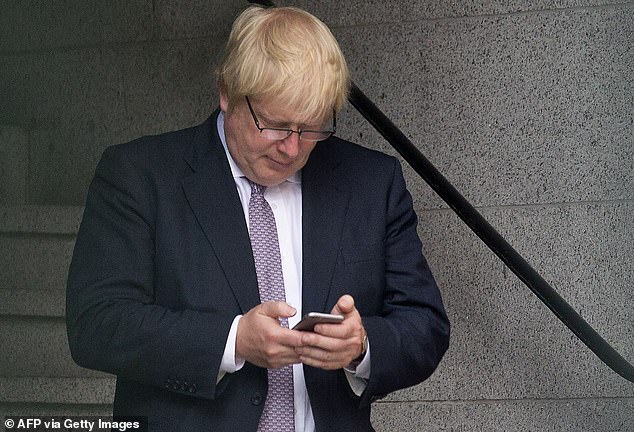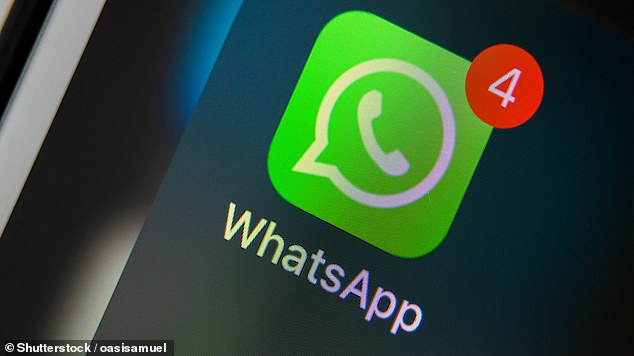Go on, admit it. You can’t do without it. Every morning – before we are even out of bed – we scrabble for the mobile.
Our fingers grope for the little green icon, a speech bubble enclosing a curiously antiquated-looking phone. We have to check who cares.
We need to know who out there is interested enough to send us a WhatsApp. Who has sent us a picture? Which of our children has sent us some news – and which friend has been so unintentionally generous as to send us something by mistake?
We poke the green logo and within seconds we are back inside our personal electronic jail – pathetically tapping and scrolling, waiting for responses, waiting for blue ticks.
Why don’t they reply? Why are they online but not responding? We wonder whether we have perhaps given some unintended offence – used an emoji of the wrong vegetable, perhaps. Before we know it we are exhibiting full junkie behaviour, waiting for our endocrine systems to give us our microdose of dopamine, and soon a whole hour has gone past, and then another hour.
When it comes to WhatsApp chats, in the words of the mysterious girl in Hotel California, we are all prisoners here – of our own device.
It is now more than 15 years since the invention of this astonishing means of instant written communication: talking at the speed of light with as many people as you want. We have become almost blasé about the advantages, our ability to share detailed real-time information – which ski-lift to meet at, when to pick the kids up from karate, which Houthi bases we have decided to bomb and when – in a way that used to be impossible.
We are producing trillions of uncensored comments, and these chats – wherever they are stored in the data banks of big tech – are now mirrors to our entire civilisation, a colossal and ever-expanding epistolary novel in which we record every twist and turn of our friendships, our marriages, our every human joy and pain.

BORIS JOHNSON admits to, like most of us, reaching for the phone first thing in the morning, checking to see who’s messaged on WhatsApp
In microscopic detail, the WhatsApp conversations chart the rise and fall of governments, the beginning and ends of wars.
Sometimes, of course, a message or a whole correspondence goes astray – a glitch in which the medium itself becomes the story.
In Tess of the D’Urbervilles, the great tragic novel by Thomas Hardy, the chain of disaster begins with a letter that gets lost under the doormat. Well, that’s nothing compared to WhatsApp. Never has there been a means of communication with such glorious potential for cock-ups, red faces and sheer cringeing catastrophe. The whole world was invited to read the details of the US operation to take out the Houthi bases in Yemen, because a journalist was mistakenly added to a Signal chat. Of course it was embarrassing – but haven’t we all been there?
How often have we written a rude message about someone, without realising they are actually in on the conversation, on a number you don’t recognise – silently drinking it in? How many times have we sent the message to the person themselves?
When Laura Kuenssberg, the distinguished BBC Political Editor, was preparing to interview me a while ago, she spent a long time cooking up the most blistering gotcha questions she could think of – complete with stage directions for her disgusted responses to my answers.
When the whole thing popped up on my WhatsApp, I at first thought she was just being decent and civilised and professional, giving me a proper chance to prepare for her questions and rebut her obviously nonsensical charges. Only with reluctance was I persuaded it was a mistake, and that in all fairness we really ought to let her know.
A mistake? I said. Not Laura! How could she make a mistake like that? But of course she could. When Freud said there are no accidents, he knew nothing of WhatsApp.
When I became PM we had so many Conservative MPs we needed at least two WhatsApp groups (those were the days, eh?), and to be frank the conversations were a bit nervous and self-conscious.

WhatsApp is owned by Meta – the parent company behind tech tycoon Mark Zuckerberg’s Facebook and Instagram

We need to know who out there is interested enough to send us a WhatsApp, BORIS JOHNSON writes. Who has sent us a picture?
Colleagues generally competed to show how much campaigning they were doing, and there were endless pictures of cheerful Tory gaggles waving blue placards, announcing the response ‘on the doors’ was terrific – which of course it was, in that long-lost age.
I always felt I should join in, but was unsure what tone to take. I would compose morale-boosting homilies, or what I hoped were devastating one-liners about the general uselessness of the Starmer opposition. But then I would imagine the terrible silence that would greet this pompous Prime Ministerial intervention – the offstage coughs, the tumbleweed rolling slowly through the electronic space. So I always hesitated, and spiked my message.
Until one day, when I was out of the country, I started getting loads of congratulatory messages from colleagues saying how much they were enjoying my message on the WhatsApp group.
I looked with horror at my first and only contribution to this political conversation, and it read, ‘Hi, babe, I am at the duty free.’
In those days I didn’t even know how to delete a message, and my despatch stayed there until it had been enjoyed by most of the parliamentary party.
Of course this technology is a boon, really – but look back at what you have read and written, and ask yourself: how much of this electronic verbiage is really necessary? How much is it costing to store in those servers and data banks, and how much energy is it consuming?
Even our finest minds are now slaves to the Whatsapp group. The other day Sarah Vine, my brilliant colleague on this paper, decided to invite people to her book launch by creating a group of her entire phonebook – prompting an ecstasy of competitive WhatsAppery between such luminaries as my sister Rachel and Piers Morgan.
Before the appalled eyes of le tout Londres these literati then spent several days discussing, why they could or couldn’t go to the party (‘Stephen Fry left’ was the most eloquent comment).
The genius of WhatsApp is that it creates a sense of immediacy – and intimacy – which is in fact misleading. I am told that younger people these days have much less time for socialising.
They don’t go to parties, not as much as we did. They don’t drink as much. Yes, my friends, I am told they tend – on the whole – to have less sexual intercourse, and this may be one of the reasons for the decline in the birth rate.
So what are they doing instead? I bet they are on Whatsapp – flirting, chatting bonding – without meeting face to face, which may be stressful and unpredictable, but remains biologically essential.
When they come to explain the 21st-century demographic implosion – and the collapse of civilisation – the tyranny of WhatsApp will be among the culprits.







